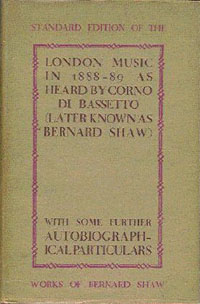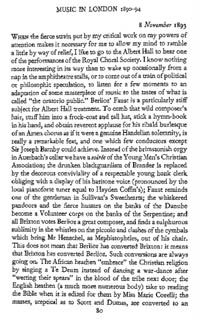
![]()
Two performances of The Damnation of Faust in London
Reviewed by
George Bernard Shaw

 |
Two performances of The Damnation of Faust in LondonReviewed by George Bernard Shaw
|
 |
George Bernard Shaw was music critic of The Star (from 1888 to 1890) and The World (from 1890 to 1894). He later published his reviews in two books, entitled London Music in 1888-89 as Heard by Corno Di Bassetto (Later Known as Bernard Shaw) with Some Further Autobiographical Particulars (first published in 1937, [standard edition], in a single volume), and Music in London 1890-94 (first published in 1932 in three volumes); Corno Di Bassetto, Italian for basset horn, was Shaw’s nom de plume.
The two reviews presented here were written on 9 July 1889 and 8 November 1893, and were reprinted, respectively, in London Music in 1888-89 as Heard by Corno Di Bassetto (pp. 155-156), and Music in London 1890-94 (vol. 3, pp. 80-82). We have preserved the original syntax and spelling style of the texts, but corrected obvious type-setting errors.
The 1893 concert took place at the Royal Albert Hall; Shaw does not mention the venue for the 1889 concert. However, Richter concerts, many of which were conducted by Dr Hans Richter, were mainly held at St James’s Hall.
9 July 1889
CALL no conductor sensitive in the highest degree to musical impressions until you have heard him in Berlioz and Mozart. I never unreservedly took off my hat to Richter until I saw him conduct Mozart’s great symphony in E flat. Now, having heard him conduct Berlioz’s Faust, I repeat the salutation. I never go to hear that work without fearing that, instead of exquisite threads of melody, wonderful in their tenuity and delicacy, and the surpassingly strange and curious sounds and measures, ghostly in touch and quaint in tread, unearthly, unexpected, unaccountable, and full of pictures and stories, I shall hear a medley of thumps and bumps and whistles and commonplaces: one, two, three, four: one, two, three, four; and for Heaven’s sake don’t stop to think about what you are doing, gentlemen, or we shall never keep the thing together. Last night there was no such disappointment. The Hungarian March I pass over, though I felt towards the end that if it were to last another minute I must charge out and capture Trafalgar Square single-handed. But when the scene on the banks of the Elbe began—more slowly than any but a great conductor would have dared to take it—then I knew that I might dream the scene without fear of awakening a disenchanted man. As to the dance of will-o’-the-wisps in the third part, Richter’s interpretation of that most supernatural minuet was a masterpiece of conducting. I need say no more. The man who succeeds with these numbers does not make the usual failure with the Easter Hymn or the Ride to Hell.
The four principal singers were, in order of praiseworthiness, Mr Max Heinrich, Mr Bantock Pierpoint, Miss Mary Davies, and Mr Edward Lloyd. I put Mr Lloyd fourth only because, there being but three others, I cannot put him fifth or sixth. I do not mind his shirking the C sharps and even the B natural in the duet with Margaret; but I indignantly demand what he meant by wantonly tampering with the Invocation at its finest point, the burst into C sharp major, on the words “My soul thrills with delight.” If Mr Lloyd had suspected what my soul thrilled with when he made the most annoyingly vulgar alteration I ever heard an artist of his eminence perpetrate, he would, I hope, have refrained. I also object to his ending the beautiful episode in F, “Oh, will ye come again” on the higher octave of the note written by Berlioz. Miss Davies is so hampered by the remains of her Academy method that she never seems quite certain of what her voice will do; but if she does not sing safely and happily, she at least sings with taste and feeling, sometimes very sweetly. Mr Pierpoint is always efficient; and Mr Max Heinrich acquitted himself like a fine artist, though the person who told him to pronounce “linings” as “lennix” is unworthy of his confidence.
The chorus did everything to perfection except sing. Their time, their tone, their enunciation, their observance of light and shade, testified to the pains taken with them by the conductor. But not even he could get any considerable volume of sound out of them. As the roaring drunkards of Auerbach’s cellar they were polite and subdued; as bragging soldiers they were decent and restrained; as convivial students chanting Jam nox stellata, etc, they did not forget that there might be a sick person in the neighborhood; and as devils in Pandemonium their voices were sweet and low. The decorum of these warblers would have done honor to the choir of the Chapel Royal.
![]()
8 November 1893
WHEN the fierce strain put by my critical work on my powers of attention makes it necessary for me to allow my mind to ramble a little by way of relief, I like to go to the Albert Hall to hear one of the performances of the Royal Choral Society. I know nothing more interesting in its way than to wake up occasionally from a nap in the amphitheatre stalls, or to come out of a train of political or philosophic speculation, to listen for a few moments to an adaptation of some masterpiece of music to the tastes of what is called “the oratorio public.” Berlioz’ Faust is a particularly stiff subject for Albert Hall treatment. To comb that wild composer’s hair, stuff him into a frock-coat and tall hat, stick a hymn-book in his hand, and obtain reverent applause for his ribald burlesque of an Amen chorus as if it were a genuine Handelian solemnity, is really a remarkable feat, and one which few conductors except Sir Joseph Barnby could achieve. Instead of the brimstonish orgy in Auerbach’s cellar we have a soirée of the Young Men’s Christian Association; the drunken blackguardism of Brander is replaced by the decorous conviviality of a respectable young bank clerk obliging with a display of his baritone voice (pronounced by the local pianoforte tuner equal to Hayden Coffin’s); Faust reminds one of the gentleman in Sullivan’s Sweethearts; the whiskered pandoors and the fierce hussars on the banks of the Danube become a Volunteer corps on the banks of the Serpentine; and all Brixton votes Berlioz a great composer, and finds a sulphurous sublimity in the whistles on the piccolo and clashes of the cymbals which bring Mr Henschel, as Mephistopheles, out of his chair. This does not mean that Berlioz has converted Brixton: it means that Brixton has converted Berlioz. Such conversions are always going on. The African heathen “embrace” the Christian religion by singing a Te Deum instead of dancing a war-dance after “wetting their spears” in the blood of the tribe next door; the English heathen (a much more numerous body) take to reading the Bible when it is edited for them by Miss Marie Corelli; the masses, sceptical as to Scott and Dumas, are converted to an appreciation of romantic literature by Mr Rider Haggard; Shakespeare and Goethe become world-famous on the strength of “acting versions” that must have set them fairly spinning in their graves; and there is a general appearance of tempering the wind to the shorn lamb, which turns out, on closer examination, to be really effected by building a badly ventilated suburban villa round the silly animal, and telling him that the frowsy warmth he begins to feel is that of the sunbeam playing on Parnassus, or the peace of mind that passeth all understanding, according to circumstances. When I was young, I was like all immature critics: I used to throw stones at the windows of the villa, and thrust in my head and bawl at the lamb that he was a fool, and that the villa builders—honest people enough, according to their lights—were swindlers and hypocrites, and nincompoops and sixth-raters. But the lamb got on better with them than with me; and at last it struck me that he was happier and more civilized in his villa than shivering in the keen Parnassian winds that delighted my hardier bones; so that now I have become quite fond of him, and love to lead him out when the weather is exceptionally mild (the wind being in the Festival cantata quarter perhaps), and talk to him a bit without letting him see too plainly what a deplorable mutton-head he is. Dropping the metaphor, which is becoming unmanageable, let me point out that the title of Berlioz’ work is The Damnation of Faust, and that the most natural abbreviation would be, not Berlioz’ Faust, but Berlioz’ Damnation. Now the Albert Hall audience would certainly not feel easy with such a phrase in their mouths. I have even noticed a certain reluctance on the part of mixed assemblies of ladies and gentlemen unfamiliar with the German language to tolerate discussions of Wagner’s Götterdämmerung, unless it were mentioned only as The Dusk of the Gods. Well, the sole criticism I have to make of the Albert Hall performance is that the damnation has been lifted from the work. It has been “saved,” so to speak, and jogs along in a most respectable manner. The march, which suggests household troops cheered by enthusiastic nursemaids, is encored; and so is the dance of sylphs, which squeaks like a tune on the hurdy-gurdy. The students’ Jam nox stellata sounds as though middle-aged commercial travellers were having a turn at it. On the whole the performance, though all the materials and forces for a good one are at the conductor’s disposal, is dull and suburban. The fact is, Berlioz is not Sir Joseph Barnby’s affair. [...]
The Hector Berlioz Website was created on 18 July 1997 by Monir Tayeb and Michel Austin; this page created on 1 February 2011.
© Monir Tayeb and Michel Austin. All rights of reproduction reserved.
![]() Back to Contemporary Performances and Articles page
Back to Contemporary Performances and Articles page
![]() Back to Home Page
Back to Home Page
![]() Retour à la page Exécutions et articles contemporains
Retour à la page Exécutions et articles contemporains
![]() Retour à la Page d’accueil
Retour à la Page d’accueil